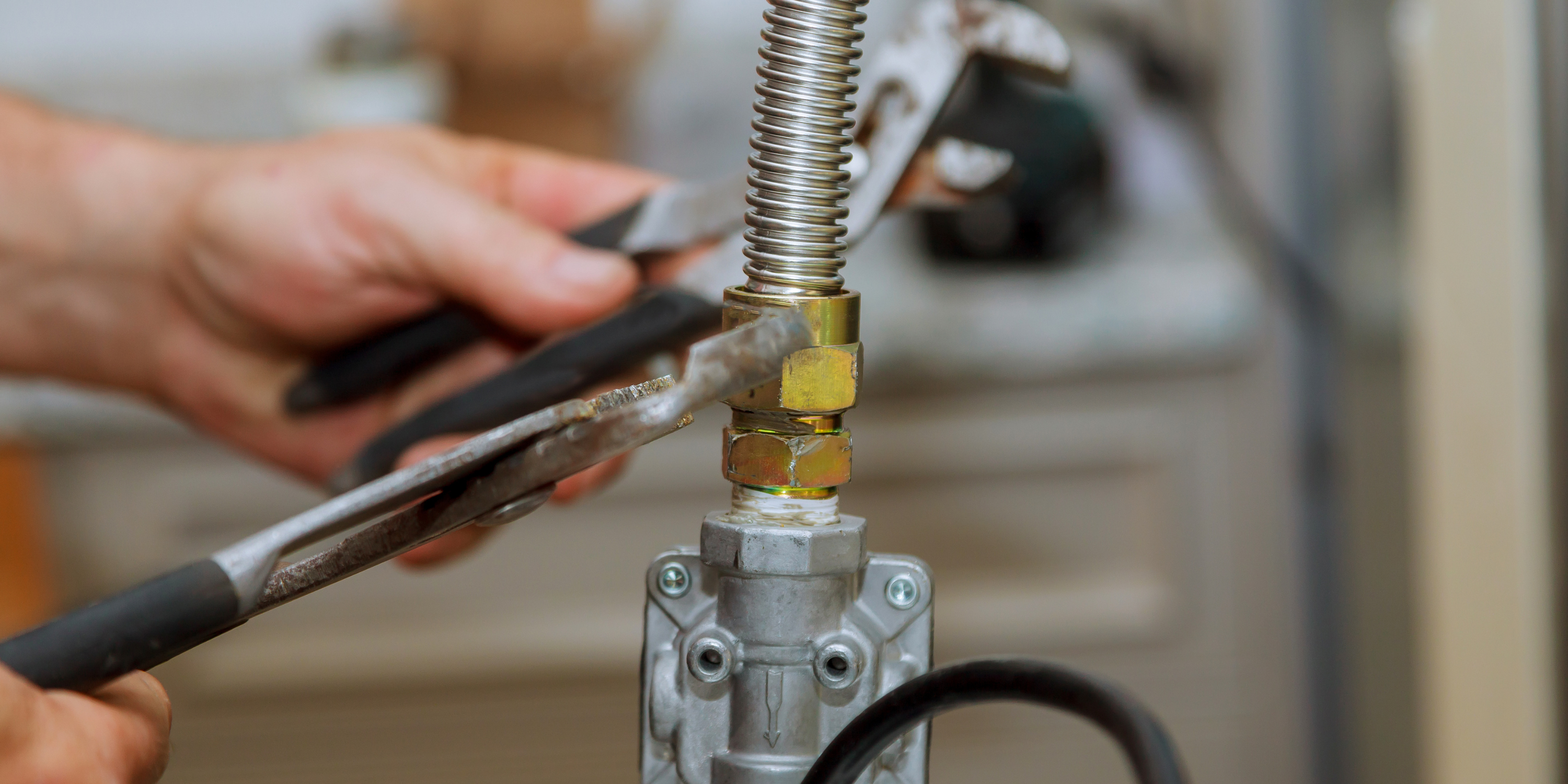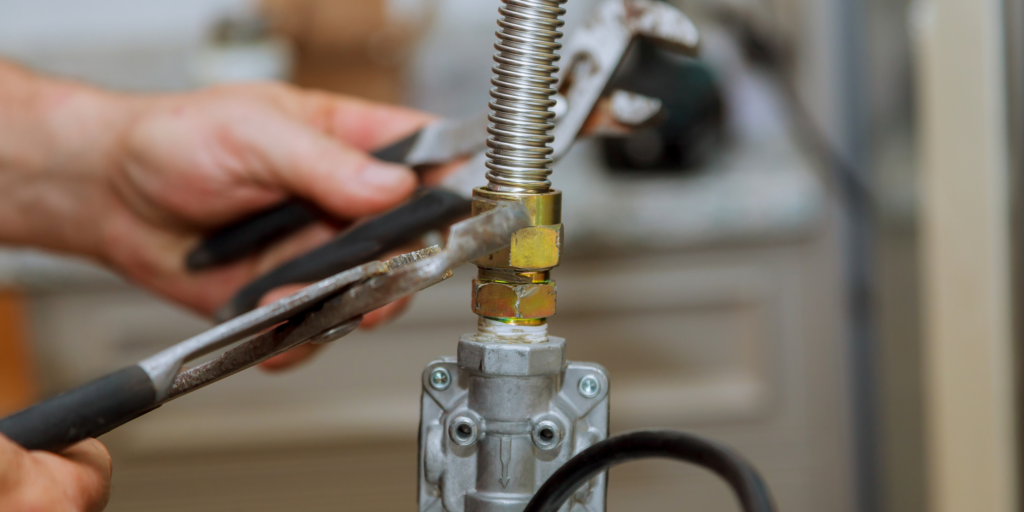Many houses feature gas lines, which provide fuel for stoves, dryers, water heaters, fireplaces, and heating systems.
Working with gas lines is not a do-it-yourself project even if natural gas and propane are affordable and efficient energy sources. Severe safety risks resulting from improper installation, leakage, or damage include fires, explosions, and carbon monoxide poisoning.
The value of professional gas line installation and repair will be discussed in this article together with the dangers of do-it-yourself gas work and how to spot indicators of a gas leak in your house.
How Do Home Gas Lines Work?
From an outside source—such as a municipal gas line or propane tank—natural gas or propane is moved by gas lines to the appliances that depend on it. Depending on their location and usage, these lines are composed of robust materials like steel, copper, or flexible polyethylene.
A well-designed gas line system reduces the chances of leaks, pressure problems, or damage and guarantees a consistent, safe flow of gas to appliances. On the other hand, improper installation of gas lines, neglect of maintenance, or damage to gas lines seriously endanger your home and your health.
The Risks of Do-It-Your-Own Gas Line Work
Attempting on your own installation, maintenance, or modification of a gas line could have disastrous results. Only licensed workers should touch gas lines for the following reasons among others:
One runs a risk of gas leaks and explosions.
Highly combustible, gas can cause serious problems from even a tiny spill. Should gas build up in a confined area and come into touch with an ignition source—such as an open flame, electrical spark, or pilot light—it might ignite or explode.
2. Poison from Carbon Monoxide
An odorless, colorless gas that is quite poisonous, carbon monoxide (CO), can escape from a poorly fitted or damaged gas pipe into equipment. High doses of inhaling CO can produce symptoms including dizziness, headache, nausea, confusion, and even death. Well-installed gas lines provide complete combustion, therefore lowering the carbon monoxide risk.
3. Legal and Code Breasts
Local construction codes and safety rules must be followed in gas line installations and maintenance. If you intend to sell your house, do-it-yourself projects that violate codes could cause fines, refused home insurance claims, or failing home inspections. Trained to satisfy all code criteria, licensed professionals guarantee compliance and safety.
4. Risk for Property Damage
Should a poorly connected gas line leak or break, it may damage appliances, start a fire, or result in expensive repairs. An expert will guarantee that gas line failures are avoided by using the right materials, fittings, and pressure levels.
5. Insufficient Skills and Tools
Gas line work calls for an understanding of gas flow, pipe sizing, and venting needs as well as specific tools and pressure testing equipment. A mistake in pipe connections or pressure settings could cause harmful leaks or disturb appliance gas supplies.
Indices of a House Gas Leak
Leaks can result from wear and tear, corrosion, or inadvertent damage, even if your gas lines were professionally built. These are some warning indicators to be on alert for:
- Utility companies add a chemical called mercaptan to natural gas to give it a noticeable sulfur or rotten egg scent. Should you smell this in your house, leave it right once and call a professional.
- A hissing or whistling sound next to a gas appliance or pipe could point to a leak.
- Dead Plants or Grass Near Gas Lines: Outdoor gas leaks can destroy surrounding plants near subterranean gas lines.
- Increased Gas Notes: A rapid rise in your gas bill without more use could point to a creeping leak.
- If you or your family get headaches, nausea, dizziness, or trouble breathing, get fresh air right away and visit a doctor.
- Should you suspect a gas leak, what should you do?
Use these safety precautions should you believe your house has a gas leak:
- Immediately evacuate; leave the house and make sure everyone safely gets outdoors.
- Steer clear of light switches, electrical appliances, matches, lighters, or flames since even a tiny spark can ignite gasoline.
- Shut off the gas supply (if safe to do so) and leave the area knowing how to properly turn off your main gas valve.
- Call for assistance from your gas provider or from emergency services from a safe distance.
- Wait for a specialist to check and guarantee that it is safe for you to re-enter your house.
- Why Should One Hire a Professional Gas Line Specialist?
1. Correct Installation and Maintenance
Licensed specialists have the knowledge to safely install, replace, and repair gas lines. They guarantee a safe connection by using exact measurements, premium materials, and correct fittings.
2: Leak Detection and Safety Inspections
Examining current gas lines for possible leaks, corrosion, or weak areas is something a skilled plumber or gas expert may do. They also find leaks that might not be obvious to the typical house owner using cutting-edge leak-detecting equipment.
3. Following Laws and Guidelines
Certified gas line experts guarantee that every work satisfies local, state, and federal safety regulations, therefore avoiding expensive fines, liability problems, and denied insurance claims.
4. Leads and Pressure Testing
Professionals force-test the gas pipes following installation or repair to guarantee there are no leaks before turning the gas back on.
5. Mental States of Calm
By hiring a licensed specialist, you can be sure your gas system is safe, therefore lowering the chances of future repairs, carbon monoxide poisoning, and fires.
Typical Professionals’ Gas Line Services
Professionals provide a variety of gas line services including:
New Gas Line Installation: For households choosing natural gas or adding gas equipment.
- Fixing leaks, cracks, or broken lines is gas line repairs.
- Connecting stoves, dryers, water heaters, fireplaces, gas appliance hook-ups
- Fast reaction to gas leaks will help to prevent hazards in an emergency.
- Examining for leaks, corrosion, or pressure problems is what gas line inspections are for.
- Last Thoughts: safeguard your family and house.Many homes include gas lines, but working with gas is quite risky without appropriate knowledge. Hiring a licensed professional for gas line installation, repairs, and inspections guarantees that your house remains compliant with safety rules, safe, and efficient.
Don’t wait until it’s too late, your safety isn’t worth the risk! Get in touch with our team today.



